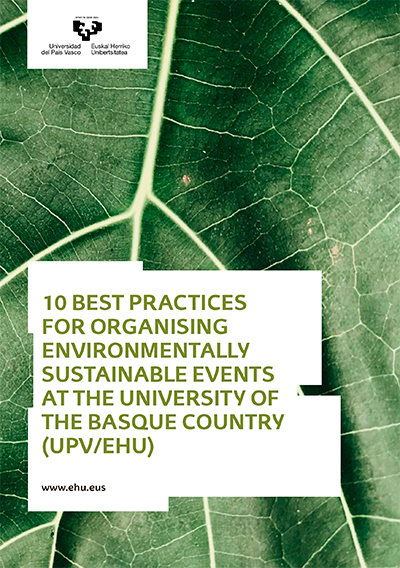10 best practices for organising environmentally sustainable events at the University of the Basque Country (UPV/EHU)
“An environmentally sustainable event is one that has been designed, organised and carried out in such a way as to minimise the potential negative impact on the environment.”
Erronka Garbia, environmental sustainability certificate for events in the Basque Country
(Ihobe, Public Environmental Management Company.Basque Government. 2016)
Whenever possible, all events organised at the UPV/EHU should promote practices that are environmentally friendly, sustainable, healthy and inclusive, such as:
01 Accessible location
Choose an accessible venue for the event, integrated in the public transport system and near university and local services and resources.
02 Sustainable transport
Provide those attending the event with information and indications of how to get to the venue using sustainable means of transport, such as public transport, car sharing, cycling or walking, and ensure accessibility for people with functional diversity, if necessaryario.
03 Reduced and efficient use of energy
Use efficient lighting and take advantage of natural light whenever possible; adjust the heating or air conditioning to meteorological and environmental conditions at the time of the event; and choose a space in accordance with expected capacity.
04 Responsible use of water
Promote the responsible use of water during the event. If possible, use jugs and glasses instead of small and/or non-reusable bottles of water.
05 Procurement and contracting services
Consider the level of commitment of product and service suppliers to environmental sustainability as an evaluation criterion for awarding contracts.
06 Healthy and sustainable food
Offer healthy and environmentally friendly food and drink options. Give preference to local suppliers and caterers who use seasonal, km 0 and/or organic products and who are committed to using non-disposable materials and keeping food waste to a minimum. Collect and give a ‘second life’ to excess products and materials.
07 Efficient waste management
Make it possible to separate waste during the event. Minimise the use of non-reusable products and promote recyclable materials.
08 Responsible communication
Use electronic means of communication to reduce paper use. Avoid using and sending paper-based documentation, informing that paper will no longer be used.
09 Participate and raise awareness in the community
Promote the active participation of people to minimise the potential negative impact of events on the environment. Involve the university community in planning and running the event and inform participants of the measures adopted and associated reduction of environmental impact.
10 Evaluation and continuous improvement
Conduct a post-event evaluation to identify areas for improvement and to learn from the experience. Consider the contributions and reactions of attendees and the organisation team to continue making the events more sustainable.
Promote any of the practices recommended by institutions such as Ihobe for organising sustainable events and, if possible, try to obtain the Erronka Garbia Sustainable Event certificate.

